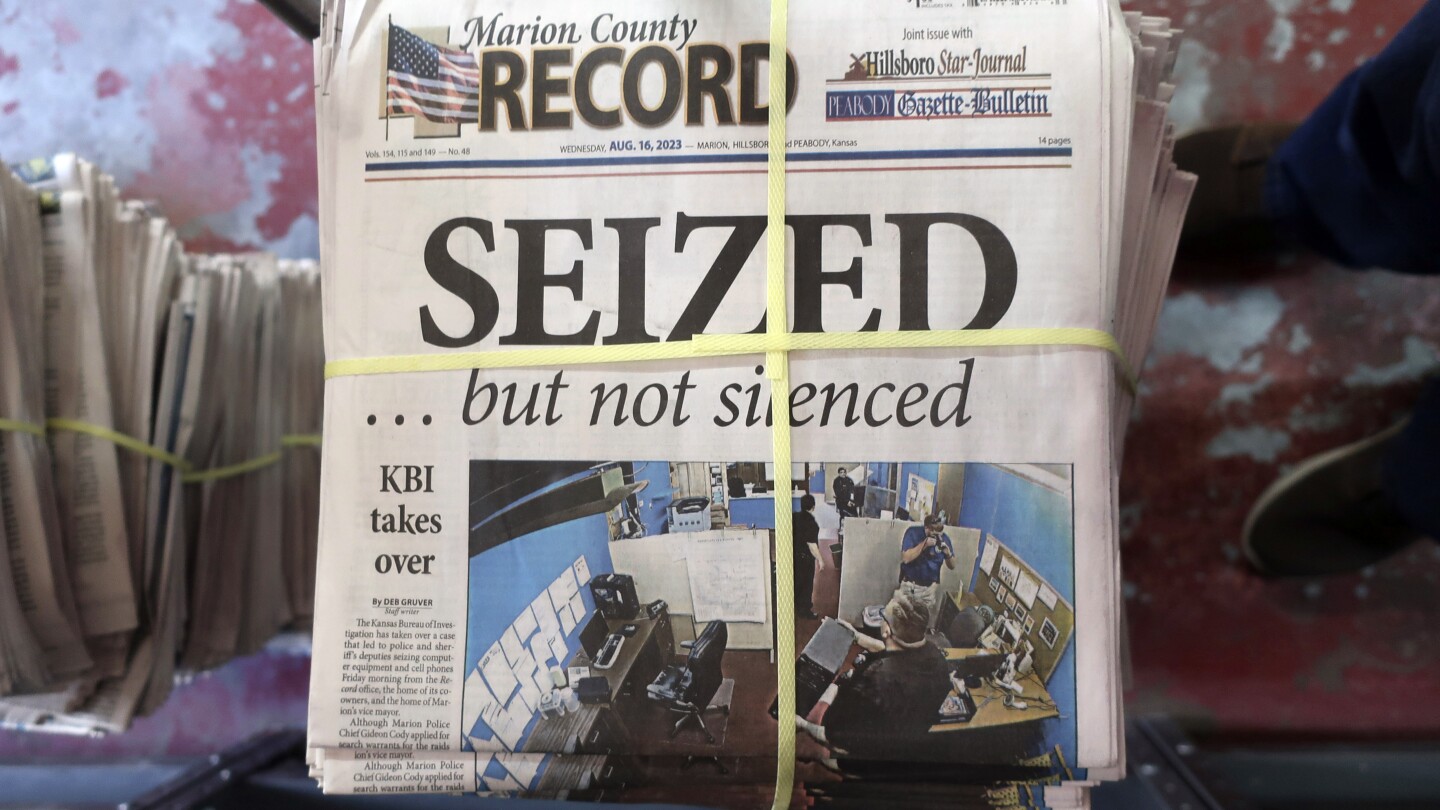- cross-posted to:
- [email protected]
- cross-posted to:
- [email protected]
The police chief who led a highly criticized raid of a small Kansas newspaper has been suspended, the mayor confirmed to The Associated Press on Saturday.
Marion Mayor Dave Mayfield in a text said he suspended Chief Gideon Cody on Thursday. He declined to discuss his decision further and did not say whether Cody was still being paid.
Voice messages and emails from the AP seeking comment from Cody’s lawyers were not immediately returned Saturday.
The Aug. 11 searches of the Marion County Record’s office and the homes of its publisher and a City Council member have been sharply criticized, putting Marion at the center of a debate over the press protections offered by the First Amendment to the U.S. Constitution.



Good faith. I don’t get the outrage here.
The article above lays out nothing about the law. Just a throwaway sentence with a link to a prior story, that quoted two legal experts who disagreed about what law the search and seizure violated.
There’s a vague allusion to potential federal criminal civil rights charges, as well as civil liability.
That’s true if the police did something wrong. I just can’t seem to pinpoint what it is the police are alleged to have done wrong here.
What statute, what recognized constitutional right?
The judge’s ruling goes against the First and Fourth Amendments (free speech, illegal search and seizure), and established case law regarding these amendments.
You don’t have to cite the cases, but what case law?
There’s no special Fourth Amendment right for journalists. The Fourth Protects warrantless search and seizure. The police here had a warrant. If the warrant affidavit didn’t support the probable cause, how? The crime alleged seems clear to me.
You can find that yourself.
Read closely, I never wrote that.
Which shouldn’t have been issued; the judge erred, and the prosecutor dropped charges against the newspaper.
Just because the judge approved it doesn’t make it legal.
The police chief may have misrepresented the reasons for the warrant; the pending lawsuit(s) should resolve this.
If you think the judge and police chief are in the right here, fine; you have a right to your opinion.
You have no argument then?
There is no First Amendment case law that allows journalists to commit crimes.
I don’t think they are in the right, or in the wrong. I don’t know enough about it because nobody seems to be able to explain it.
I know “the police chief(?) may have misrepresented” blah blah blah, isn’t a reason. The police chief did not write the warrant application. What fact in the warrant was misrepresented?
And here we go again. I never said there was, so stop the straw man bullshit.
Yeah well, I didn’t know what you were trying to say.
Okay, a nexus issue, that’s something, still not a misrepresentation, it’s a scope and nexus issue. I have to think about that one and maybe another look at the warrants. That’s on the judge, as your quote says, it “essentially threw Judge Viar under the bus.”
That’s just splitting hairs.
Never mind the “may have”; he actually did misrepresent the facts:
The police chief claimed the reporter (Phyllis Zorn) could only obtain the driver’s record by impersonating the “victim” or lying about the reasons the record was being sought.
Zorn said an unidentified source gave her a copy of the driver’s record, which she then verified on a state public records database. This directly contradicts the police chief’s accusations.
The newspaper said it didn’t run the story because they felt their source’s motives were questionable. Then after the raid, they did because it was relevant to the raid.
According to the newspaper’s attorney, Bernie Rhodes:
Source
The chief still didn’t write the affidavit.
According to the newspaper’s attorney, who of course says it was legal! Nobody is more biased on this question. Good try though.
I read the stature and there are 14 reasons that can allow someone to look up public driving records. The journalist didn’t meet any of them.
They are listed here in subsection b items 1 to 14. Which one do you think the paper fell under?
It’s the same list that I have to check off as an attorney when I use a public record databases such as LexisNexis. Here they are:
https://www.law.cornell.edu/uscode/text/18/2721
If you read carefully, the newspaper’s argument is that the law intends to make driving records records publicly available, so the paper was allowed to access the records.
That’s true if they are released to the paper under FOIA. These records contained personal information on private individuals, so they were not foiable, and were publicly available only if one of the 14 rights of access from that federal statute applies. And indeed there was no FOIA request. So, the journalist either impersonated the subject of the record, or falsely certified to one of the rights of access enumerated in the statute.
You keep moving the goalposts. First it’s a misrepresentation made the warrant invalid, then it’s that the warrant was too broad, now it’s that the conduct alleged in the warrant is true but was not actually criminal. Hmm.